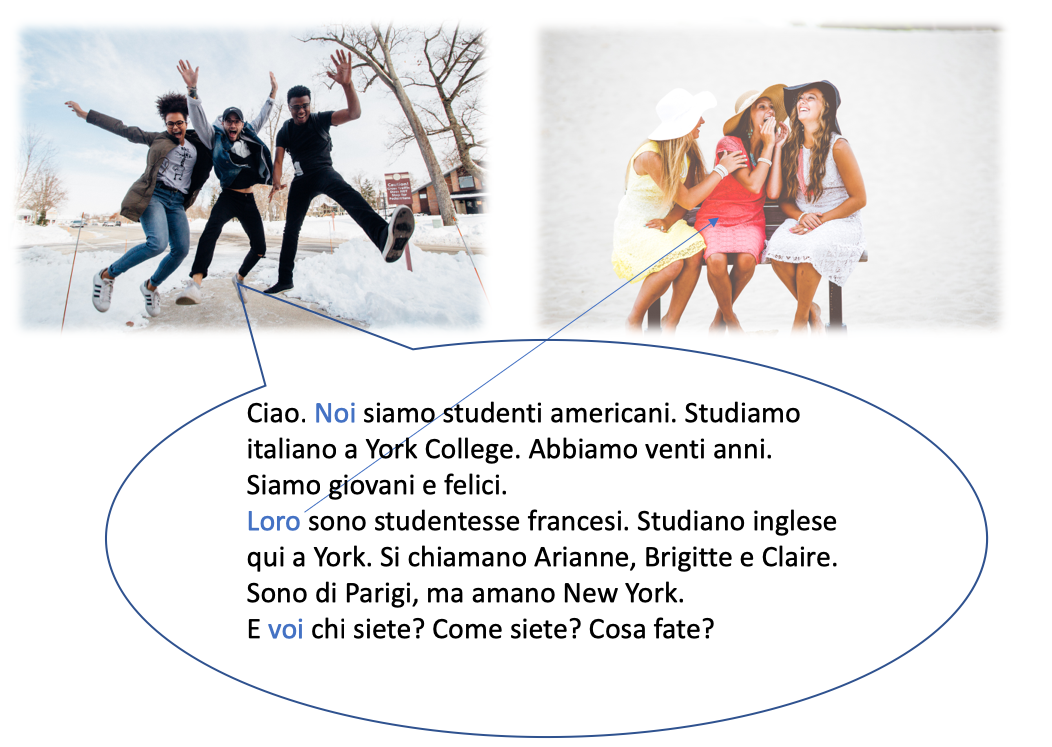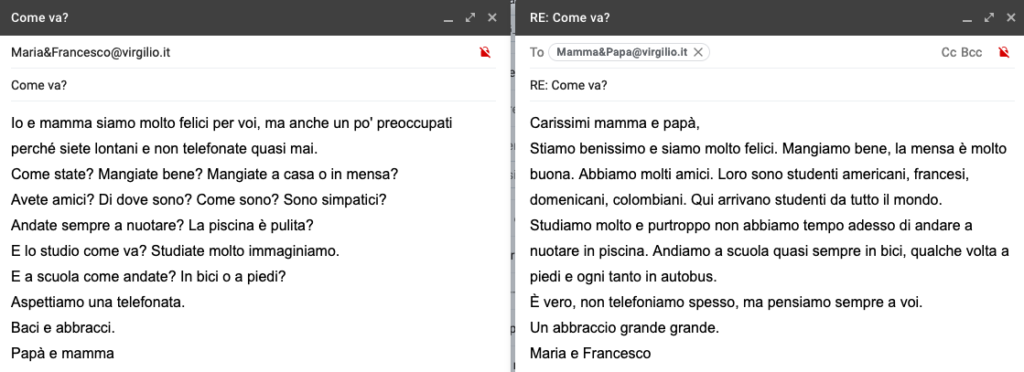We, you all, and they
| Listen to the following presentations.
|
- Noi is the equivalent of ‘we’: Noi studiamo italiano (‘We study Italian’)
- Voi is the equivalent of ‘you’ plural (you all): Voi chi siete? (‘Who are you [all]?’).
- Loro is the equivalent of ‘They’: Loro sono studentesse francesi (‘They are French [female] students’)
- As for io, tu, lui, lei, and lei form., noi, voi, and loro can be easely omitted
- You see that the form of the verbs (as well as the nouns and adjectives) change according to the subject
| Read the following emails.
|
Listen to how to pronounce the following Italian words and phrases:
- Cari (dear) / Carissimi (dearest)+ the name of the recipients are familiar ways to address someone, whether you know them (as in this case) or no
- Mamma (mom), papà (dad)
- Baci e abbracci (hugs and kisses, literally kisses and hugs), un abbraccio grande grande (a big big hug) are friendly and affectionate ways to end an email or a letter
- Da tutto tutto il mondo (from all around the world), anche se (even if), purtroppo (unfortunately), un po’ (a little [bit])
- Non avere tempo di + infinitive verb (Not to have time to do something)
- Sempre (always), quasi sempre (almost always), spesso (often),
- Ogni tanto (once in a while), adesso (now)
Andare (to go) is one of the most frequently used Italian verbs. When followed by a + an infinite verb (andare a ballare, andare a nuotare, etc.) it is the equivalent of to go + ….-ing (to go dancing, to go swimming, etc.). In all the other cases andare is used to indicate a place where one goes and several prepositions can be used. Learn some of them and more vocabulary. To practice on vocabulary and pronunciation, use Quizlet. NOTE: a) All the above expressions (a scuola, in biblioteca, etc.) can also be used with the verb essere (to be) to indicate the place where someone is (Sono a scuola ‘I am at school‘, Sono in biblioteca ‘I am at the library’, etc.), mangiare, studiare, etc. (Mangio a casa ‘I eat at home‘, Studio in biblioteca ‘I study in the library‘, etc.) to indicate where someone does something, and with all other verbs of movement (camminare a scuola ‘to walk to school‘, arrivare a casa ‘to arrive home‘, etc.). b) Tavolo or Tavola? You already known the masculine word tavolo. Italian also has the feminine form tavola. What is the difference? Tavolo is used to describe a piece of furniture per se (tavolo da disegno ‘drawing table’, tavolo da stiro ‘ironing board’, etc.) or for a table in a restaurant. Tavola is used instead to describe the dining table, not as a piece of furniture, but in reference to the place where meals are eaten (io vado a tavola, noi siamo a tavola, voi mangiate a tavola, etc.). Andare with means of transportation.  |
| GRAMMAR Essere and Avere You have already studied the verbs essere (to be) and avere (to have) with io, tu, lui and lei, including Lei formal (see Unità 1 and Unità 2). Below you find the forms for noi (we), voi (you all), and loro (they). Click HERE for the complete conjugation of essere and avere.
Regular Italian verbs in –are: noi, voi and loro forms
Verbs ending in –care (giocare ‘to play a game/sport’) and –gare (pagare ‘to pay’) add an h immediately after the root when declinations start with i (tu, as you already know and, and noi forms) to maintain the hard c or hard g sound. See the table below for a sample conjugation of giocare a (to play).
Unfortunately, not all verbs follow the regular pattern -are, so often you just have to memorize them individually. This is the case of the verb andare (to go) and stare (to stay, to remain).
A Difficult Choice: a or in?
|
Tasks
|
Pratice
Previous > “Lei” formale
Next > Dal singolare al plurale

